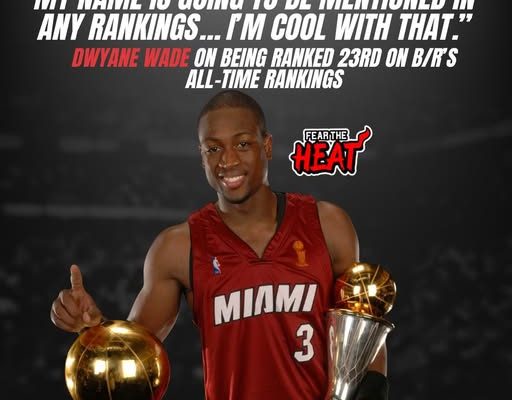Dwyane Wade has never been the kind of player who needed a microphone to be heard, but every time he speaks—especially when it comes to legacy—his words echo across generations of basketball fans. Now retired, a Hall of Famer, an icon of Miami Heat culture, and an ambassador of the game, Wade could easily flex his resume and demand his place in the pantheon of all-time greats. But if you listen closely, he doesn’t seem to care much about rankings. To him, the respect of his peers, the reverence of the next generation, and the memories he’s etched into the game’s fabric are more than enough. When Wade says, “I’m just grateful to be mentioned,” it’s not deflection—it’s humility grounded in confidence. That’s his GOAT mentality.
Wade’s legacy isn’t just about the numbers, though they are elite in every sense. Over the course of his 16-year career, he amassed over 23,000 points, 5,700 assists, and 4,900 rebounds. He was a 13-time All-Star, a three-time NBA champion, the 2006 Finals MVP, and a member of the NBA’s 75th Anniversary Team. And while some might argue over whether he’s a top-20 or top-30 player of all time, Wade has never chased statistical validation. He’s chased greatness in a different way—through sacrifice, leadership, resilience, and authenticity.
When Wade reflects on his career, he doesn’t talk about climbing higher on all-time lists. He talks about relationships. About culture. About being a pillar. He speaks about what it meant to carry a franchise, to elevate others, to redefine what it means to be a shooting guard in a league that already had Michael Jordan and Kobe Bryant towering over the position like mythic deities. He could have easily crumbled under those comparisons, but instead, he found his own path—one lined with unselfishness and lined with gold.
What makes Wade unique is that he knows what it’s like to be the guy—and also to share the stage with other greats. He didn’t just win titles. He gave away the keys in order to win them. In 2010, when LeBron James and Chris Bosh joined the Miami Heat, it was Dwyane Wade’s city, his team, his banner in the rafters. And yet, he recognized that for the team to reach its ceiling, he needed to let LeBron lead. That decision wasn’t just savvy—it was selfless. It cemented Wade’s status as the ultimate teammate, someone who prioritized legacy over ego.
Still, no matter how generous Wade is in crediting others, his greatness can’t be dimmed. Go back to the 2006 NBA Finals, where a 24-year-old Wade put up one of the greatest Finals performances in league history. After falling behind 0–2 to the Dallas Mavericks, Wade exploded over the next four games, averaging 39.3 points, 8.3 rebounds, and 3.5 assists to bring Miami its first NBA title. That series wasn’t just a win—it was a coronation. He wasn’t waiting in line behind Jordan or Kobe. He was forging his own chapter. It was the kind of performance that turned skeptics into believers and turned a rising star into a superstar.
Even with all that, Wade’s outlook on legacy remains refreshingly honest. In today’s era, where players and fans constantly engage in debates about the “GOAT”—the Greatest of All Time—Wade takes a different stance. He doesn’t get caught up in who’s first, second, or fifth. He’s not trying to campaign for his own placement. In fact, he openly admits that he grew up idolizing Michael Jordan, and even today, considers players like Kobe Bryant and LeBron James to be on different levels in terms of cultural and on-court dominance. Yet he doesn’t feel slighted. He feels proud—proud to be in the room, proud to be in the conversation, proud to have earned the respect of those who came before him and those who followed.
There’s a grounded sense of self-awareness in Wade’s perspective. He knows that greatness isn’t always quantifiable. Sure, accolades help. Stats matter. But for Wade, it’s about more than numbers. It’s about impact. It’s about whether kids wear your jersey. Whether players try to mimic your game. Whether franchises build around your model of leadership. In Miami, Wade is more than a legend—he’s a cultural institution. The city doesn’t just love him; it breathes him. His influence is stitched into the Heat’s DNA—from their toughness to their loyalty to their work ethic. Even today, players walking through the doors of Kaseya Center feel the gravity of Wade’s shadow, not as pressure but as inspiration.
He’s also shaped the next generation of NBA stars in more ways than one. Whether mentoring players like Donovan Mitchell, offering advice to young upstarts, or leading in his role as part-owner of the Utah Jazz, Wade has never turned his back on the game. His post-retirement chapters show a man who not only succeeded on the court but evolved off it. He’s used his platform to speak on fatherhood, identity, and social issues—showing that the true measure of a legacy is how one lives once the lights dim.
In a way, Wade’s approach to the GOAT conversation is its own form of quiet genius. While others campaign for recognition or argue over their spot in the pecking order, Wade simply lets his work speak. It’s the same attitude that made him a killer on the court and a leader in the locker room. His humility doesn’t mask insecurity; it reveals a man who knows exactly what he did—and doesn’t need to be loud about it. The quiet confidence is part of what made his style so thrilling. He didn’t rely on a deadly jumper like Curry or the brute force of a Shaq. He was a slasher, a finisher, a mid-range assassin who used timing, angles, and toughness to outmaneuver bigger opponents. And he did it with flair. The pump fakes, the euro-steps, the chase-down blocks—Wade made the game both effective and beautiful.
One of the greatest endorsements of Wade’s status comes from his peers. Kobe Bryant once said that Wade was one of the toughest competitors he ever faced. LeBron James has repeatedly referred to Wade as his favorite teammate. Chris Paul, Carmelo Anthony, and other contemporaries regard Wade not just as an elite player, but as someone who elevated the collective. That kind of respect can’t be fabricated. It’s earned over years of sweat, pain, sacrifice, and consistency.
Even fans who didn’t root for the Heat couldn’t deny Wade’s brilliance. He had a way of making the impossible look routine—whether it was a falling-away jumper to beat the buzzer, a ferocious dunk through contact, or a clutch steal to seal a win. Watching Wade was watching a masterclass in controlled chaos. He didn’t need to dominate the game in loud, overwhelming fashion. He chose his moments—and when those moments came, he was surgical.
For Wade, being called someone’s GOAT—especially from fans or younger players—is the highest form of flattery. He understands that greatness is subjective. For some, it’s Jordan. For others, it’s LeBron, or Kobe, or Steph. But for millions, it’s Wade. And that’s enough. It doesn’t have to be unanimous. It doesn’t have to be ranked. Greatness, in its truest form, transcends numbers and debate. It’s about how a player makes you feel. And Dwyane Wade made fans feel everything—joy, heartbreak, awe, hope.
So when he says, “That’s my GOAT,” he’s not just pointing to someone else. He’s validating everyone’s experience. He’s saying it’s okay to have your own version of greatness. For some, that GOAT might be someone who won ten rings. For others, it might be someone who only won one, but changed their life. For countless people in South Florida and beyond, that GOAT is Wade—not because the numbers scream it, but because the memories do.
That kind of legacy doesn’t fade. It multiplies. It trickles down through generations of fans and future players. It lingers in highlight reels, in signature moves, in the way a young guard attacks the rim because Wade once did. In the same way Wade idolized Jordan and shaped his game around that ideal, some kid right now is crafting his dreams around Wade. And that, more than anything else, proves his point.
He doesn’t need the crown to know he’s a king. He doesn’t need to win the debate to know he won. His name, his game, his influence—it’s all cemented. Forever. And while others chase rankings, Dwyane Wade sits back, smiles, and simply says thank you.



